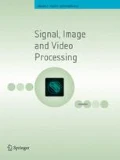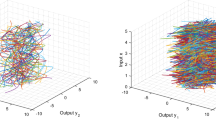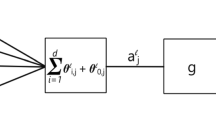Abstract
In this paper, a novel use of adaptive filters for blind source separation is presented. The known independent component analysis algorithm separates signals from their mixtures based on the observation that a mixture of statistically independent signals is more Gaussian than the separate signals. Similarly, an adaptive filter, that is designed to minimize the Gaussianity of its output, relies on the same hypothesis. The proposed adaptive filter uses all the mixture signals, the observation signals, as its inputs—one as the main input, and the rest as reference inputs. The filter is iteratively modified, using gradient descent, such that the measure of non-Gaussianity of its output is maximized, leading to the separation of one source signal at its output. To separate the N source signals from the given N mixtures, N such adaptive filters are used. The proposed method has been successfully applied to the blind separation of multiple signals.










Similar content being viewed by others
References
Hyvärinen, A., Karhnen, J., Oja, E.: Independent Component Analysis. Wiley, New York (2001)
Makino, S., Lee, T.W., Sawada, H.: Blind speech separation. Springer, Netherland (2007)
Haykin, S.: Adaptive Filter Theory, vol. 4. Prentice Hall, New Jersey (2002)
Amari, S., Cichocki, A.: Adaptive Blind Signal and Image Processing. Wiley, New York (2002)
Tanrikulu, O., Constantinide, A.G.: Least-mean kurtosis: a novel higher-order statistics based adaptive filtering algorithm. Electron. Lett. 30(3), 189–190 (1994)
Gillespie, B. W., Malvar, H. S., Florêncio, D. A.: ‘Speech Deconvolution via Maximum-KurtosisSubband Adaptive Filtering’, in Proceedings of the ICASSP, vol. 6, Salt Lake City, UT, May 7–11, 2001, pp. 3701–3704 (2001)
Yoo, J.W., Park, P.: An improved Least Mean Kurtosis (LMK) Algorithm for sparse system identification. Int. J. Inf. Electron. Eng. 2(6), 940–943 (2012)
Sanubari, J.: Analysis of steady state excess mean square error of the least mean kurtosis adaptive algorithm, in 14th European Signal Processing Conference, Florence, Italy, September 2006
Zarzoso, V., Nandi, A.: Non-invasive fetal electrocardiogram extraction: blind separation versus adaptive noise cancellation. IEEE Trans. Biomed. Eng. 48, 1 (2001)
Author information
Authors and Affiliations
Corresponding author
Additional information
Publisher's Note
Springer Nature remains neutral with regard to jurisdictional claims in published maps and institutional affiliations.
Rights and permissions
About this article
Cite this article
Benzvi, D. Multiple least mean kurtosis adaptive filters for blind source separation. SIViP 15, 871–876 (2021). https://doi.org/10.1007/s11760-020-01808-y
Received:
Revised:
Accepted:
Published:
Issue Date:
DOI: https://doi.org/10.1007/s11760-020-01808-y




